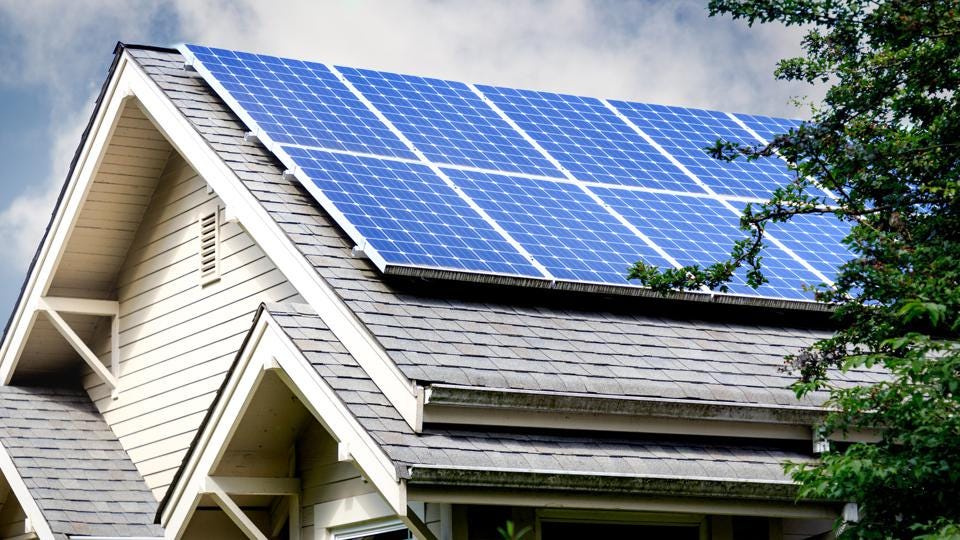
In an era where environmental consciousness is on the rise, many homeowners are turning to renewable energy sources to power their homes. One popular choice is solar energy, harnessed through the installation of solar panels. While the prospect of clean, sustainable energy is appealing, it’s essential to weigh the pros and cons before making the commitment to solar power for your home.
Pros of Installing Solar Panels
Renewable and Sustainable
One of the primary advantages of solar panels is that they harness energy from the sun, a virtually infinite and renewable resource. Unlike fossil fuels, solar energy does not deplete over time, making it a sustainable option for the long term.
Reduced Electricity Bills
Solar panels generate electricity for your home, reducing your dependence on traditional utility providers. This translates to lower electricity bills over time, as you can generate your power during sunny days and potentially sell excess energy back to the grid.
Environmental Impact
Solar power is a clean and green energy source, producing minimal environmental pollution and greenhouse gas emissions compared to conventional fossil fuels. By installing solar panels, homeowners contribute to a reduction in their carbon footprint, promoting a healthier planet.
Government Incentives
Many governments offer financial incentives, tax credits, and rebates to encourage homeowners to adopt solar power. These incentives can significantly offset the initial installation costs, making solar panels a more attractive investment. Find reliable solar energy contractors in your state and ask them about incentives.
Increased Property Value
Homes equipped with solar panels often experience an increase in property value. Potential buyers are increasingly interested in energy-efficient homes, and solar panels can be a major selling point for eco-conscious individuals.
Cons of Installing Solar Panels
High Initial Costs
The upfront cost of purchasing and installing solar panels can be a significant deterrent for many homeowners. While prices have decreased over the years, the initial investment remains a barrier for some, despite the long-term savings on energy bills.
Weather Dependence
Solar panels rely on sunlight to generate electricity. Cloudy days and nighttime render the panels less effective, necessitating a backup power source or energy storage system. This weather dependence can affect the reliability of solar power in some regions.
Space Requirements
Effective solar power generation often requires a considerable amount of space. Not all homes have sufficient roof space or open areas to accommodate the necessary number of solar panels for optimal energy production. This limitation may be a constraint for some homeowners.
Aesthetics and Design Challenges
Some individuals find solar panels aesthetically unpleasing or believe they clash with the design of their homes. Striking a balance between energy efficiency and maintaining the desired appearance of a home can be challenging, and not all homeowners are willing to compromise on aesthetics.
Technological Advances
The field of solar technology is rapidly advancing, and newer, more efficient models are continually being developed. This poses a challenge for early adopters, as their systems may become outdated sooner than expected, potentially requiring expensive upgrades.
Solar panel installation
For those seeking a reliable and experienced partner in the transition to solar power, Puget Sound Solar would be an excellent choice. With a proven track record of excellence in both residential and commercial projects, Puget Sound Solar brings a wealth of expertise to the table. Their team of skilled professionals ensures the precise installation of solar panels and also provides tailored advice, guiding clients through the entire process. From initial consultations to post-installation support, the company prioritizes customer satisfaction, offering a commitment to efficiency, reliability, and cutting-edge technology. With a focus on maximizing energy efficiency and minimizing environmental impact, Puget Solar is the trusted choice for individuals and businesses alike, dedicated to empowering clients with the benefits of sustainable energy.
Conclusion
Installing solar panels to power your home is a decision that involves careful consideration of both the advantages and disadvantages. While the environmental benefits, cost savings, and government incentives make solar power an appealing choice, the initial costs, weather dependence, and design challenges may deter some homeowners. Ultimately, the decision to invest in solar panels should align with your long-term goals, budget, and commitment to sustainability. As technology continues to evolve, it’s essential to stay informed about the latest advancements in solar energy to make the most informed decision for your home and the planet.








